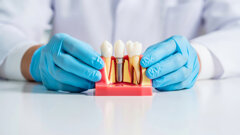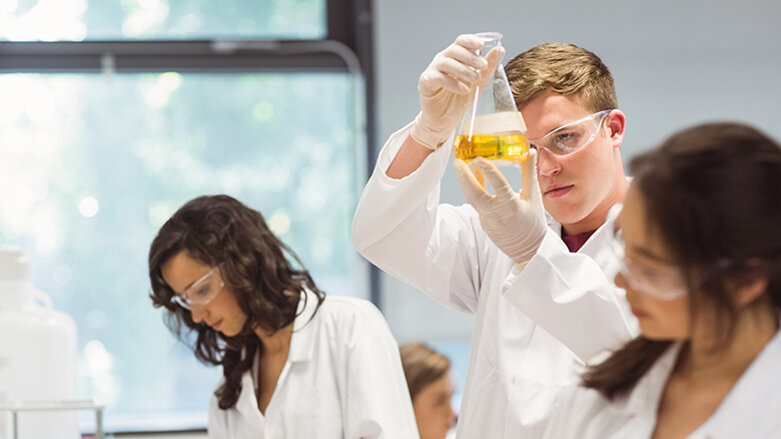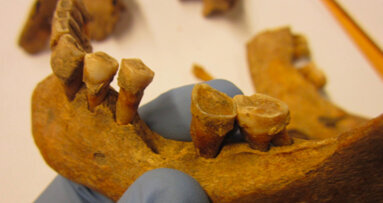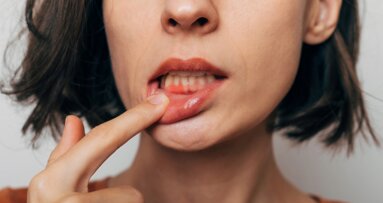PROVO, Utah, U.S.: Researchers from Brigham Young University (BYU) in the U.S. have found that students are more engaged in course material and learning when they have access to their own biological data. Students enrolled in undergraduate science courses were able to use their own microbiome information in completing assignments, and the scientists reported that this integration of personal microbiome analysis in the classroom significantly improved interest.
“Whenever you can have students looking at something about themselves, it increases their desire to understand and also hopefully what they take away from the class,” said study co-author Dr. Steve Johnson, Associate Professor in the Department of Microbiology and Molecular Biology at BYU’s College of Life Sciences.
As part of the study, Johnson and fellow microbiology and molecular biology researcher Dr. Scott Weber at BYU and their colleagues monitored the attitudes of juniors and seniors enrolled in undergraduate immunology, molecular biology and genomics courses with a two-week microbiome unit. At the beginning of the semester, students were given the option to use their own personal information gained through a microbiome kit or to use demo data. Gathered from swabs taken from the mouth, nose, skin and gut, their microbiome data were sequenced, and the students were then able to look at either the raw data, which they could use for further research, or the analysis given on their microbiomes.
To measure the results of personal microbiome analysis as a means of improving science education, a survey was sent to the students before, during and after the microbiome unit to determine how and if their interest and engagement were affected. Students who analyzed their own microbiome data reported spending 31 percent more time researching the microbiome than students who used demo data did. Students who used the kits also had increased confidence in their scientific reasoning ability and data interpretation skills and found the overall course significantly more interesting and engaging.
“I felt more personally invested in learning about names of bacteria when I knew that things like Bacteroidetes and Akkermansia could be protective to my health,” said Josie Tueller, a college senior who participated in the study.
Weber and Johnson hope that finding more opportunities to apply these practices in other disciplines will further increase student engagement in science education and be an effective tool for inspiring lifelong learning.
The oral microbiome, along with the gut microbiome, is one of the two most diverse microbiotas in the human body. The Human Oral Microbiome Database states that there are approximately 700 prokaryotic taxa that have been identified as existing in the oral cavity, so the information available to students was coming from a very diverse source.
The study, titled “Personal microbiome analysis improves student engagement and interest in Immunology, Molecular Biology, and Genomics undergraduate courses,” was published in PLOS ONE on April 11, 2018.
Tags:
COPENHAGEN, Denmark: A number of recent studies have shown that dental calculus from archaeological samples could be a rich source for better understanding ...
Dear members of all EU dental dealer associations, presidents and secretaries,
LONDON, UK: The General Dental Council (GDC) has recently announced that the number of dentists on the UK register remained stable after the annual renewal ...
ANTWERP, Belgium: Research has found conflicting results regarding whether the popular bactericidal mouthwash LISTERINE promotes or undermines a healthy ...
NEW YORK, US: Oral diseases and depression are both projected to rise in prevalence over the coming decades, and recent findings suggest the two may be ...
TAMPA, Fla., U.S.: With oropharyngeal cancer related to the human papillomavirus (HPV) on the rise, oral health professionals can play a key role in ...
LONDON, Canada: The use of artificial intelligence (AI) in dentistry is rapidly expanding, offering new possibilities in diagnostics, treatment planning and...
GUIYANG, China: Severe periodontitis continues to place a growing strain on global oral health. New Global Burden of Disease 2021 data has revealed ...
NEW YORK, U.S.: The New York University College of Dentistry (NYU Dentistry) has received funding and in-kind support from Straumann Group North America, a ...
MANCHESTER, UK: Dental guidelines in the UK, as in many countries, are predicated upon the knowledge that dental infections respond better to treatment ...
Live webinar
Tue. 24 February 2026
1:00 pm EST (New York)
Prof. Dr. Markus B. Hürzeler
Live webinar
Tue. 24 February 2026
3:00 pm EST (New York)
Prof. Dr. Marcel A. Wainwright DDS, PhD
Live webinar
Wed. 25 February 2026
11:00 am EST (New York)
Prof. Dr. Daniel Edelhoff
Live webinar
Wed. 25 February 2026
1:00 pm EST (New York)
Live webinar
Wed. 25 February 2026
8:00 pm EST (New York)
Live webinar
Tue. 3 March 2026
11:00 am EST (New York)
Dr. Omar Lugo Cirujano Maxilofacial
Live webinar
Tue. 3 March 2026
8:00 pm EST (New York)
Dr. Vasiliki Maseli DDS, MS, EdM



 Austria / Österreich
Austria / Österreich
 Bosnia and Herzegovina / Босна и Херцеговина
Bosnia and Herzegovina / Босна и Херцеговина
 Bulgaria / България
Bulgaria / България
 Croatia / Hrvatska
Croatia / Hrvatska
 Czech Republic & Slovakia / Česká republika & Slovensko
Czech Republic & Slovakia / Česká republika & Slovensko
 France / France
France / France
 Germany / Deutschland
Germany / Deutschland
 Greece / ΕΛΛΑΔΑ
Greece / ΕΛΛΑΔΑ
 Hungary / Hungary
Hungary / Hungary
 Italy / Italia
Italy / Italia
 Netherlands / Nederland
Netherlands / Nederland
 Nordic / Nordic
Nordic / Nordic
 Poland / Polska
Poland / Polska
 Portugal / Portugal
Portugal / Portugal
 Romania & Moldova / România & Moldova
Romania & Moldova / România & Moldova
 Slovenia / Slovenija
Slovenia / Slovenija
 Serbia & Montenegro / Србија и Црна Гора
Serbia & Montenegro / Србија и Црна Гора
 Spain / España
Spain / España
 Switzerland / Schweiz
Switzerland / Schweiz
 Turkey / Türkiye
Turkey / Türkiye
 UK & Ireland / UK & Ireland
UK & Ireland / UK & Ireland
 Brazil / Brasil
Brazil / Brasil
 Canada / Canada
Canada / Canada
 Latin America / Latinoamérica
Latin America / Latinoamérica
 USA / USA
USA / USA
 China / 中国
China / 中国
 India / भारत गणराज्य
India / भारत गणराज्य
 Pakistan / Pākistān
Pakistan / Pākistān
 Vietnam / Việt Nam
Vietnam / Việt Nam
 ASEAN / ASEAN
ASEAN / ASEAN
 Israel / מְדִינַת יִשְׂרָאֵל
Israel / מְדִינַת יִשְׂרָאֵל
 Algeria, Morocco & Tunisia / الجزائر والمغرب وتونس
Algeria, Morocco & Tunisia / الجزائر والمغرب وتونس
 Middle East / Middle East
Middle East / Middle East












































To post a reply please login or register